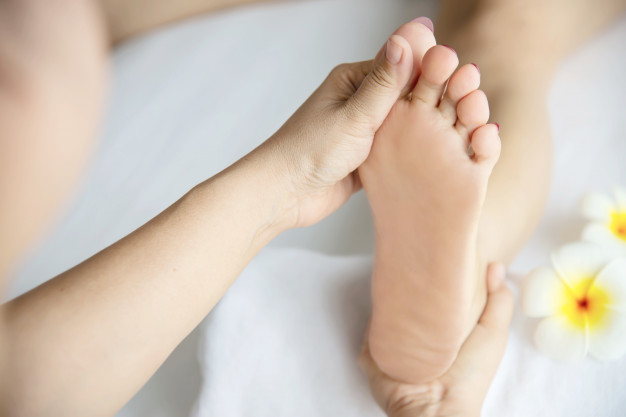
Take Care Of Your Feet If You’ve Diabetes
People with diabetes have a high risk of foot problems. If you’re diabetic, it’s really important for you to take care of your feet properly. There is a chance that ordinary foot problems can get worse and lead to serious complications.
Various Foot Complications
The various foot complications that may arise due to diabetes are:-
- Neuropathy – Diabetes can result in less blood circulation in your legs and feet, resulting in nerve damage. You may or may not feel any pain, or hot/ cold sensations, especially in your feet. This is called neuropathy. You may also feel burning, stinging, tingling, or weakness in your feet due to neuropathy.
- Skin Changes – Diabetes can cause changes to the skin of your foot. Your foot skin may become dry, peel, and crack. This is due to failure of nerves that control the oil and moisture in your foot.
- Calluses – Diabetic people have more chances of getting calluses on their feet due to high pressure areas under the foot. Calluses, if not trimmed, get very thick, break down, and turn into ulcers. Make sure not to cut calluses or corns yourself. This can lead to ulcers and infection.
- Foot Ulcers – Ulcers occur on the ball of the foot, or on the sides of the foot, or on the bottom of the big toe, due to poor fitting of shoes. Remember, every ulcer should be seen by your health care provider right away, even if does not hurt. Neglecting ulcers can result in infections, which can lead to loss of a limb.
- Amputation – Diabetic people have a higher risk of foot or leg amputated than other people. This happens due to peripheral arterial disease (PAD), which reduces blood flow to the feet.
How To Take Care Of Your Feet If You’ve Diabetes?
If you have diabetes, make sure to follow these preventive measures to take care of your feet:-
- Keep a check on your feet daily for sores, cuts, blisters, or redness, especially in between the toes.
- Keep your feet clean and dry. Wash them with warm water properly. Remember to dip your elbows to check the water temperature.
- Use a pumice stone or an emery board to file corns and calluses gently, after your bath or shower.
- Cut your toenails regularly. Don’t cut them too short. Make sure to cut your nails after taking bath when they are soft.
- Consult with your doctor if you don’t have good feeling in your feet.
- Moisturize your feet properly after getting out of the shower. Don’t let your feet get too dry or cracked.
- Always wear shoes or slippers while walking. Moreover, make sure to get a foot exam at least once a year.
- Do not wear your shoes without socks. Socks will help protect your feet from sores or cuts. Moreover, wear well fitted shoes to avoid getting blisters or sores.
- Visit your doctor if you observe any changes in your feet.
When To Consult With A Health Care Provider?
Consult with doctor if you notice:-
- Changes in skin temperature.
- Changes in skin color.
- Swelling in your foot or ankle.
- Pain in your legs.
- Ingrown toenails or toenails infected with fungus.
- Open sores on your feet that are draining or slow to heal.
- Corns or calluses.
- Dry cracks in the skin, especially around the heel.
- Unusual and/or persistent foot odor.


